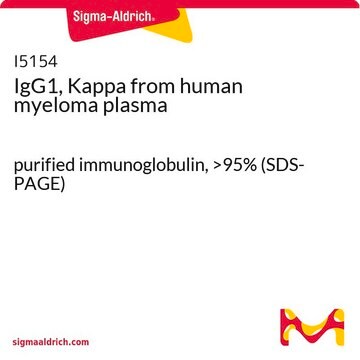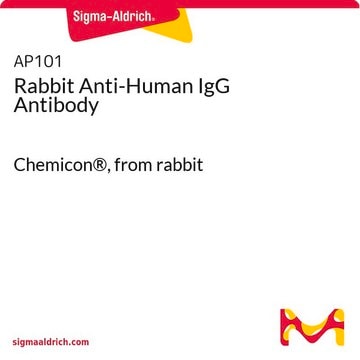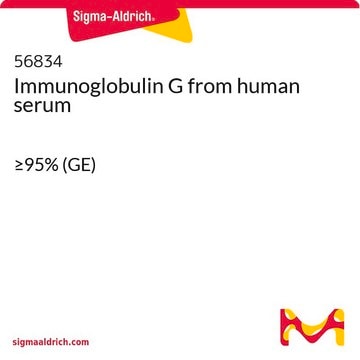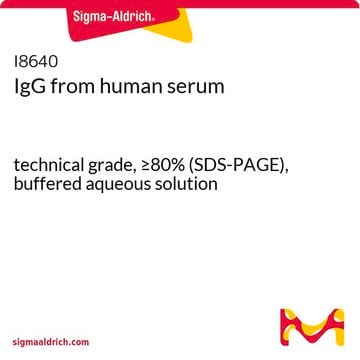401116
Human IgG, Fab Fragment, Plasma
Synonym(s):
IgG Fab fragment
Sign Into View Organizational & Contract Pricing
All Photos(1)
About This Item
UNSPSC Code:
12352202
NACRES:
NA.77
Recommended Products
Assay
≥95% (SDS-PAGE)
Quality Level
form
liquid
manufacturer/tradename
Calbiochem®
storage condition
OK to freeze
solubility
sterile distilled water: soluble
shipped in
ambient
storage temp.
−20°C
target post-translational modification
unmodified
General description
Immunoglobulin G (IgG) is the most crucial glycoprotein antibody. It has the longest serum half-life compared to other immunoglobulins. IgG is present in human serum and also identified in the bloodstream. It contains four polypeptide chains, wherein the light and heavy chains are linked by disulfide bonds.
Application
Human IgG, Fab Fragment, Plasma has been used in enzyme-linked immunosorbent assay (ELISA).
Biochem/physiol Actions
Immunoglobulin G (IgG) initiates the classical pathway of the complement system and eliminates virus particles and toxins. It controls antibody-dependent cell-mediated cytotoxicity (ADCC) and might be correlated to allergy. Digestion of IgG by papain generates fragment antigen-binding (Fab) whereas pepsin digestion of IgG releases crystallizable (Fc) fragment and a single dimeric F(ab)2. Maternal IgG is transferred to the fetus via the placenta and is crucial for the immune defense of the neonate against infections. IgG levels in severe acute respiratory syndrome coronavirus (SARS-CoV)2 infected patients may be useful to understand the severity and prognosis of coronavirus disease 2019 (COVID-19).
Warning
Toxicity: Standard Handling (A)
Physical form
In 150 mM NaCl, 20 mM sodium phosphate buffer, 0.05% NaN₃, pH 7.4.
Preparation Note
Prepared from plasma that has been shown by certified tests to be negative for HBsAg and for antibodies of HIV and HCV.
Reconstitution
Following reconstitution, aliquot and freeze (-20°C). Stock solutions are stable for up to 6 months at -20°C.
Legal Information
CALBIOCHEM is a registered trademark of Merck KGaA, Darmstadt, Germany
Disclaimer
RESEARCH USE ONLY. This product is regulated in France when intended to be used for scientific purposes, including for import and export activities (Article L 1211-1 paragraph 2 of the Public Health Code). The purchaser (i.e. enduser) is required to obtain an import authorization from the France Ministry of Research referred in the Article L1245-5-1 II. of Public Health Code. By ordering this product, you are confirming that you have obtained the proper import authorization.
Storage Class Code
12 - Non Combustible Liquids
WGK
nwg
Flash Point(F)
Not applicable
Flash Point(C)
Not applicable
Certificates of Analysis (COA)
Search for Certificates of Analysis (COA) by entering the products Lot/Batch Number. Lot and Batch Numbers can be found on a product’s label following the words ‘Lot’ or ‘Batch’.
Already Own This Product?
Find documentation for the products that you have recently purchased in the Document Library.
S G Johansson et al.
Allergy, 56(9), 813-824 (2001-09-12)
This report has been prepared by an EAACI task force representing the five EAACI Sections and the EAACI Executive Committee composed of specialists that reflect the broad opinion on allergy expressed by various clinical and basic specialties dealing with allergy.
WeiYu Lin et al.
PloS one, 15(12), e0244158-e0244158 (2020-12-22)
The proactive generation of anti-idiotypic antibodies (anti-IDs) against therapeutic antibodies with desirable properties is an important step in pre-clinical and clinical assay development supporting their bioanalytical programs. Here, we describe a robust platform to generate anti-IDs using rabbit single B
Hongyan Hou et al.
Clinical & translational immunology, 9(5), e01136-e01136 (2020-05-10)
This study aimed to determine the IgM and IgG responses against severe acute respiratory syndrome coronavirus (SARS-CoV)-2 in coronavirus disease 2019 (COVID-19) patients with varying illness severities. IgM and IgG antibody levels were assessed via chemiluminescence immunoassay in 338 COVID-19
Harry W Schroeder et al.
The Journal of allergy and clinical immunology, 125(2 Suppl 2), S41-S52 (2010-03-05)
Immunoglobulins are heterodimeric proteins composed of 2 heavy and 2 light chains. They can be separated functionally into variable domains that bind antigens and constant domains that specify effector functions, such as activation of complement or binding to Fc receptors.
Gestur Vidarsson et al.
Frontiers in immunology, 5, 520-520 (2014-11-05)
Of the five immunoglobulin isotypes, immunoglobulin G (IgG) is most abundant in human serum. The four subclasses, IgG1, IgG2, IgG3, and IgG4, which are highly conserved, differ in their constant region, particularly in their hinges and upper CH2 domains. These
Our team of scientists has experience in all areas of research including Life Science, Material Science, Chemical Synthesis, Chromatography, Analytical and many others.
Contact Technical Service


